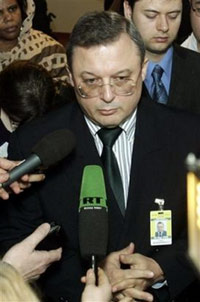|
Iran: Negotiations still possible
(Agencies)
Updated: 2006-02-05 17:35

Russia's Ambassador to the IAEA Gregory Berdennikov is surrounded by media after the International Atomic Energy Agency's (IAEA) 35-nation board meeting on escalating nuclear standoff with Iran, on Saturday, Feb. 4, 2006, at Vienna's International Center. [AP] |
Iran insists its nuclear program is for peaceful energy purposes and in the last two days has assured that it would continue to honor its obligations under the Nuclear Nonproliferation Treaty. But it has also repeatedly vowed it will not give up its right under NPT to enrich uranium and produce nuclear fuel.
"In the name of the IAEA they want to visit all our nuclear facilities and learn our defense capabilities, but we won't allow them to do this," Ahmadinejad said Sunday.
In the past, Iran had allowed short-notice, intrusive inspections of its facilities, including military sites as a goodwill gesture to build trust.
But parliament passed a law late last year requiring the government to block intrusive inspections of Iran's facilities if the country is put before the Security Council. It also required the government to resume all suspended nuclear activities, chief among them, uranium enrichment.
Ahmadinejad ordered the implementation of the law on Saturday, and Vice President Gholamreza Aghazadeh said he would enforce the presidential order Sunday.
"(Nuclear) research and development activities and preparations for utilizing the nuclear fuel production technology for peaceful purposes needs to be seriously enforced," Ahmadinejad said in his presidential order, but stressed that Iran would stick to its obligations under the NPT.
Asefi on Sunday also reiterated that Iran would cooperate with the IAEA within the framework of the NPT and the Safeguard Agreement.
"We chose our way wisely. We have solutions for all situations that may develop. Referring Iran to the Security Council will definitely harm the other party more than Iran," Asefi said.
Twenty-seven of 35 member nations on the IAEA board voted for Iran's referral. Cuba, Venezuela and Syria voted against, and five members abstained.
After years of opposition, Russia and China backed the referral last week, bringing support from other nations who had been waiting for their lead.
But in return, Moscow and Beijing demanded that the Americans -- and France and Britain, the two other veto-wielding Security Council members -- agree to let the Iran issue rest until at least March, when the IAEA board meets again to review the agency's investigation of Iran's nuclear program and its compliance with board demands that it renounce uranium enrichment.
The IAEA resolution requests Director General Mohamed ElBaradei to "report to the Security Council" with steps Iran needs to take to dispel suspicions about its nuclear ambitions.
These include that it return to freezing uranium enrichment; consider stopping construction of a heavy-water reactor that could be the source of plutonium; formally ratify the agreement allowing the IAEA greater inspecting authority and give the nuclear watchdog more power in its investigation of Iran's nuclear program.
The resolution and Ahmadinejad's order to resume enrichment and end intrusive inspections may provoke a major international crisis.
Tension rose to high levels last month after Iran removed U.N. seals and began nuclear research including small-scale uranium enrichment.
That came after months of futile talks between Iran and Britain, Germany and France, which negotiated on behalf of the 25-nation European Union.
|